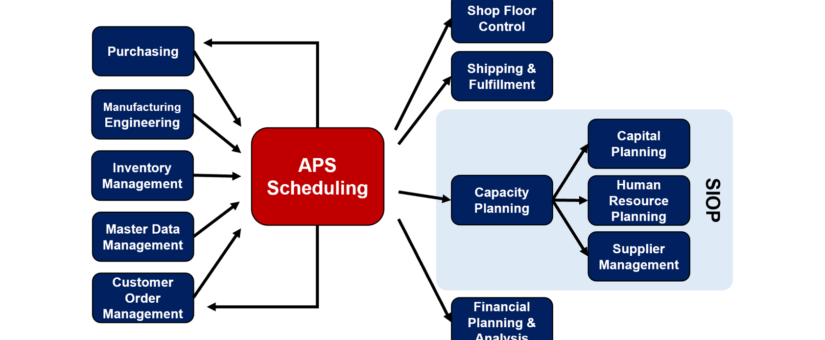
Some Manufacturers May Benefit from Advanced Planning and Scheduling (APS) in More Ways Than They Realize
- On 08/27/2019
There are a variety of downstream business processes where APS can play a productive key role
Advanced Planning and Scheduling (APS) is well known for its role in driving material purchasing and shop floor manufacturing operations. However, there are also a number of other business functions where APS can provide essential information to customers and managers.
Most APS Implementations Don’t Work Well
It’s also a sad fact that most manufacturers are not running their APS scheduling in an effective way and end up instituting manual workarounds to make up for misapplied ERP automation. A regional ERP users’ group was asked what topics they would like to hear more about, and production scheduling was at the top of the group’s list.
As can be seen in the graphic above, APS depends on a lot of other parts of the system working well and so it’s not unexpected that APS is usually one of the last elements of an ERP system to be optimized. To make matters worse, having good upstream process and master data are not enough. The overall APS approach and philosophy must also be effective. APS systems are often implemented in ways that violate basic control system theory and make effective supply chain and manufacturing operations virtually impossible as explained in the following three-minute video:
With the challenges of achieving effective APS scheduling aside, let’s see what other parts of the business can be favorably affected through stable, realistic, and predictive APS scheduling.
How APS Supports Strategic Business Planning
Some of the downstream areas that can benefit from effective APS scheduling can be grouped under the general umbrella of Sales, Inventory, and Operations Planning (abbreviated as SIOP or S&OP). SIOP is a formalized management process that seeks to match manufacturing capacity to forecasted changes in customer demand so that the company can optimally throttle its operations up to meet growing demand or down to prepare for market downturns. This provides critical “over-the-horizon” strategic planning that can affect capital investment and workforce levels to effectively time the market and protect cash flow. APS is an important enabler for good SIOP.
A major aerospace manufacturer established a new SIOP process, which was then able to help avoid approximately $500 million of excess inventory during the onset of the 2008 recession. Smaller manufacturers and distributors also stand to benefit from instituting such management practices. In fact, a good SIOP process may in some cases be a life saver that prevents businesses from falling over a cliff during periods of diminished market demand.
Specific areas that can benefit from effective APS scheduling include:
- SIOP planning sub-processes:
- Capacity Planning. APS, together with well formulated demand forecasts, can provide a realistic and detailed view of supply chain and manufacturing shop floor loading over a desired planning horizon. Note that contrary to popular beliefs, finite capacity scheduling does NOT provide accurate capacity planning information.
- Capital Planning. The need for capital equipment can be identified and justified based on accurate shop floor loading forecasts.
- Human Resource Planning. APS-generated loading forecasts are useful for determining direct labor staffing requirements for each part of the factory.
- Supplier Management. APS can provide loading information for suppliers to help predict supplier bottlenecks.
- Financial Planning and Analysis (FP&A). Realistic projected schedules generated by APS can be used to predict revenue recognition over a planning horizon and estimate cash flows.
- Shipping and Fulfillment. Effective APS scheduling can be used by customer-facing organizations to reliably estimate completion dates. As has been noted before, most manufacturers do not implement their APS correctly and therefore are not able to provide their customers with reliable estimated completion dates (ECDs).
- Purchasing. Effective APS scheduling will enable JIT purchase planning via MRP.
- Custom Order Management. Well-posed APS schedules will allow the manufacturer to confidently accept new orders and make customer commitments that can be reliably fulfilled.
- Shop Floor Control. Altemir Consulting pioneered the use of APS to support lean shop floor control using the Lean MRP methodology. This novel pull-based approach enables reduced work-in-process (WIP) inventory, shorter manufacturing lead times, and better on-time performance.
Altemir Consulting specializes in APS production scheduling and shop floor control. Feel free to contact us to learn more about what we can do to transform your advanced planning and scheduling into a useful tool and core asset.
